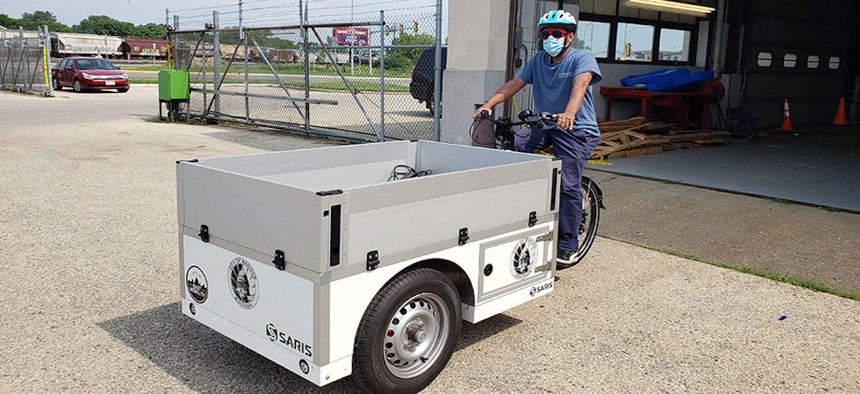Electric Cargo Bikes Are Debuting in City Fleets

The bikes, manufactured in Amsterdam, can carry up to 881 pounds (rider and payload). Saris Infrastructure
Under a pilot program, parks employees in Portland, Oregon will conduct trail maintenance using zero-emission bikes that were specifically designed for municipal employees.
Employees in Portland, Oregon’s parks bureau will have a new way to get to the trails they maintain in the coming months, riding out on an electric-assist cargo bike with enough storage space to handle trash and debris.
The three-wheel bike, designed specifically for use by municipal employees, is being provided to the city for free by distributor Saris Infrastructure as part of a pilot program to test the vehicles’ capabilities in various city tasks.
The cargo bike, manufactured by Amsterdam-based Urban Arrow, can carry a maximum of 881 pounds (rider and payload) and has a 250-watt engine. The model can be made in a number of different configurations, including a flatbed, a pick-up and several different cargo boxes, including one that’s temperature-controlled. The bike has zero emissions and can “effectively supplement the standard city fleet offerings of a single-occupant car or a light-duty truck,” according to Saris.
“We didn’t want this to be just a novelty,” Mike Basarich, director of Saris Infrastructure, said in a statement. In addition to its hauling capabilities, he added, the bike “is healthier for employees and potentially much more efficient—no more fighting for parking spaces or adding to congestion.”
Saris, the manufacturer’s North American distributor, had originally offered the bike to Portland’s Bureau of Transportation, which had intended to use it in the summer for deliveries to businesses that obtained permits to operate in the streets during the Covid-19 pandemic.
“But the timing didn't work out,” said Dylan Rivera, a spokesman for the transportation bureau. “But we thought it could potentially be a really useful resource, so our staff kept it in mind and spread the word to our colleagues, and the parks staff felt like they had a specific need they could fulfill, potentially, with this.”
The bike will be used for trail maintenance in at least one location, including trash and debris clean-up, but could expand to others during the pilot program, said Mark Ross, spokesman for the city’s parks bureau. The city is expected to use the bike for up to four months.
Portland is the second city to pilot the bikes, following an ongoing program in Madison, Wisconsin, where Saris is headquartered. The program there began last summer in the city’s Fleet Services department, which used the bikes to move parts between locations. Later, employees in the engineering department’s greenway vegetation program used the bikes as well, hauling equipment and brush from vegetation maintenance along bike paths, ponds and greenways.

“Covid safety restrictions have eliminated vehicle sharing, so the cargo bike has the added bonus of allowing us to get an employee to a site with needed tools and equipment without having to use a personal vehicle,” Madeline Dumas, the city’s greenway vegetation coordinator, said in a statement.
Participants in the pilot program track the miles they ride and answer short surveys about the experience of doing their jobs by bike, information that will be used by Saris to “better actualize how they can be used” by cities around the country.
The pilot will be the second in Portland to use e-cargo bikes, following a partnership last year that replaced a UPS delivery truck in a university district with one of the cycles. Rivera said the technology makes sense for Portland, an extremely bike-friendly city with the goal of reaching net-zero carbon emissions in the next 30 years.
“We certainly are interested in any way we can continue to try to lower our carbon emissions and reach other sustainability goals for the city,” he said.
Kate Elizabeth Queram is a staff correspondent for Route Fifty and is based in Washington, D.C.
NEXT STORY: Traffic estimation tool makes predictions from sparse public data





